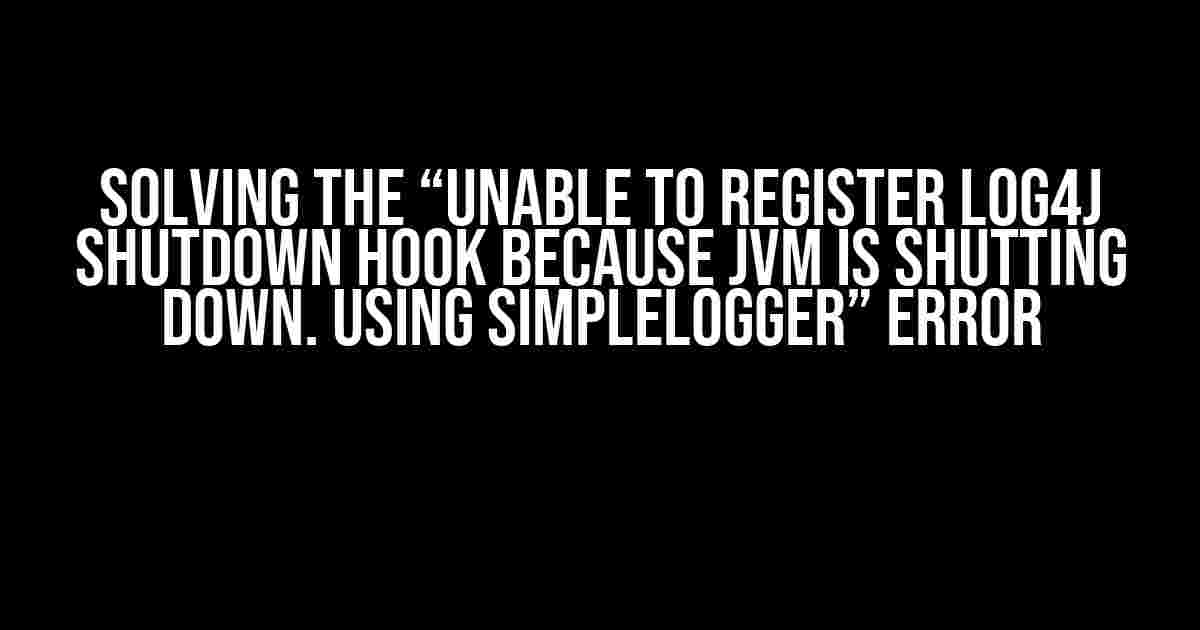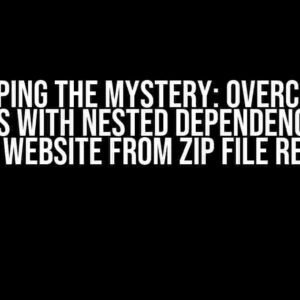Are you tired of encountering the frustrating “Unable to register Log4j shutdown hook because JVM is shutting down. Using SimpleLogger” error in your Java application? Look no further! In this comprehensive guide, we’ll delve into the root causes of this error, explore possible solutions, and provide step-by-step instructions to get your logging setup up and running smoothly.
What is Log4j and Why Do I Need It?
Log4j is a popular logging framework for Java applications that allows developers to log events and messages at different levels of severity. It’s an essential tool for debugging, troubleshooting, and monitoring application performance. With Log4j, you can configure logging settings, appenders, and layouts to suit your specific needs.
Why Am I Seeing This Error?
The “Unable to register Log4j shutdown hook because JVM is shutting down. Using SimpleLogger” error typically occurs when Log4j is unable to register its shutdown hook with the Java Virtual Machine (JVM). This usually happens when the JVM is in the process of shutting down, and Log4j is trying to register its hook to perform cleanup tasks.
Causes of the Error
The error can be triggered by a combination of factors, including:
- Incompatible Log4j version
- Incorrect logging configuration
- JVM shutdown sequence issues
- Conflicting dependencies
- SimpleLogger usage
Solutions to the Error
Don’t worry; we’ve got you covered! Let’s explore the top solutions to resolve the “Unable to register Log4j shutdown hook because JVM is shutting down. Using SimpleLogger” error:
Solution 1: Update Log4j Version
Make sure you’re running the latest version of Log4j. You can update your dependencies in your `pom.xml` file (if you’re using Maven) or your `build.gradle` file (if you’re using Gradle).
<dependency>
<groupId>org.apache.logging.log4j</groupId>
<artifactId>log4j-api</artifactId>
<version>2.14.1</version>
</dependency>
<dependency>
<groupId>org.apache.logging.log4j</groupId>
<artifactId>log4j-core</artifactId>
<version>2.14.1</version>
</dependency>
Solution 2: Configure Logging Correctly
Review your logging configuration to ensure it’s correct and complete. Check your `log4j2.xml` file for any syntax errors or incomplete configurations.
<?xml version="1.0" encoding="UTF-8"?>
<Configuration status="WARN">
<appenders>
<ConsoleAppender name="Console" target="SYSTEM_OUT">
<PatternLayout pattern="%d{yyyy-MM-dd HH:mm:ss} [%t] %-5level %logger{36} - %msg%n"/>
</ConsoleAppender>
</appenders>
<loggers>
<root level="debug">
<appender-ref ref="Console"/>
</root>
</loggers>
</Configuration>
Solution 3: Adjust JVM Shutdown Sequence
In some cases, the JVM shutdown sequence can cause Log4j to fail when registering its shutdown hook. Try adding the following code to your application’s shutdown hook:
Runtime.getRuntime().addShutdownHook(new Thread() {
public void run() {
LogManager.shutdown();
}
});
Solution 4: Resolve Conflicting Dependencies
If you’re using other logging frameworks or libraries, ensure they’re not conflicting with Log4j. Check your dependencies for any version conflicts or overlapping functionality.
Solution 5: Avoid Using SimpleLogger
SimpleLogger is a basic logger implementation that’s included with Log4j. However, it’s not ideal for production environments. Instead, use the `LogManager` class to configure and manage your logging setup.
Best Practices for Log4j Configuration
To avoid common pitfalls and ensure smooth logging operations, follow these best practices:
- Use the latest version of Log4j
- Keep your logging configuration files (e.g., `log4j2.xml`) separate from your application code
- Avoid using SimpleLogger in production environments
- Configure logging levels and appenders carefully to avoid performance impacts
- Monitor your logging setup for errors and performance issues
| Best Practice | Description |
|---|---|
| Use the latest version of Log4j | Ensure you’re running the latest version of Log4j to benefit from bug fixes and new features. |
| Keep logging configuration separate | Keep your logging configuration files separate from your application code to simplify maintenance and updates. |
| Avoid using SimpleLogger | Avoid using SimpleLogger in production environments, as it’s not designed for high-performance logging. |
| Configure logging levels carefully | Configure logging levels and appenders carefully to avoid performance impacts and ensure accurate logging. |
| Monitor logging setup | Monitor your logging setup for errors and performance issues to ensure timely detection and resolution of issues. |
Conclusion
In conclusion, the “Unable to register Log4j shutdown hook because JVM is shutting down. Using SimpleLogger” error can be resolved by updating Log4j, configuring logging correctly, adjusting the JVM shutdown sequence, resolving conflicting dependencies, and avoiding SimpleLogger usage. By following the best practices outlined in this article, you’ll be well on your way to a smooth and efficient logging setup.
Remember, logging is an essential aspect of any Java application. Don’t let errors and configuration issues hold you back. Take control of your logging setup today and ensure your application runs smoothly and efficiently!
Frequently Asked Question
Ever wondered what’s behind the cryptic “Unable to register Log4j shutdown hook because JVM is shutting down. Using SimpleLogger” error? We’ve got you covered!
What is Log4j shutdown hook and why is it important?
Log4j shutdown hook is a mechanism that allows Log4j to properly close its resources, such as closing files and releasing locks, when the application is shutting down. This ensures that Log4j can clean up after itself and prevent unexpected behavior or crashes.
Why does Log4j use a shutdown hook in the first place?
Log4j uses a shutdown hook to ensure that it can perform cleanup operations even when the application is abruptly terminated, such as when the JVM is shutting down. This prevents Log4j from leaving behind dangling resources or unclosed files.
What happens when Log4j is unable to register its shutdown hook?
When Log4j is unable to register its shutdown hook, it may lead to unexpected behavior, such as Log4j not closing its files properly, or leaving behind locks that can cause issues in future runs. In such cases, Log4j falls back to using the SimpleLogger, which is a basic logging mechanism that logs messages to the console.
What is SimpleLogger and how does it differ from regular Log4j logging?
SimpleLogger is a basic logging mechanism that comes into play when Log4j is unable to register its shutdown hook. It logs messages to the console, but lacks the advanced features and configuration options of regular Log4j logging. SimpleLogger is a fallback mechanism that ensures some basic logging functionality, but it’s not as robust or customizable as regular Log4j logging.
How can I avoid the “Unable to register Log4j shutdown hook” error?
To avoid this error, ensure that Log4j is properly initialized and configured before the application starts shutting down. You can do this by calling `org.apache.logging.log4j.core.config.Configurator.shutdown()` explicitly, or by using a logging configuration file that properly configures Log4j.






